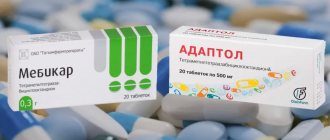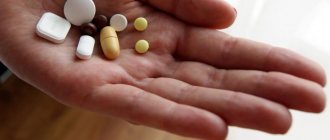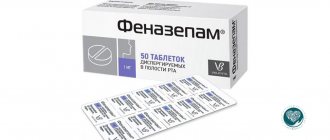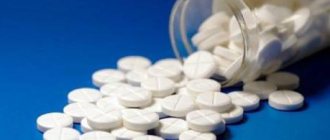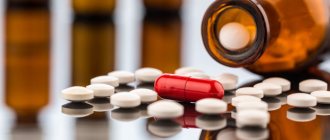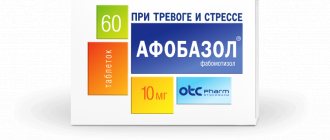Consequences
Adaptol has low toxicity and is usually well tolerated. Allergic manifestations and digestive disorders are possible after consuming large doses. In this case, you should stop taking the drug. In case of intoxication, perform a gastric lavage procedure. There may be a decrease in blood pressure and body temperature, which normalize on their own and do not require stopping the drug. The medicine may cause a bitter taste in the mouth and dizziness in the first week of taking it.
Adaptol has not been tested on pregnant women, so in this situation it is better to consult a doctor rather than self-medicate.
Adaptol is a rather weak drug; it is unlikely to help with severe psychoneurological disorders. In such cases, a more serious, comprehensive examination under the supervision of specialists is necessary.
The drug helps improve brain function. It is prescribed for excitability, nervous and stress disorders.
The success of the drug’s effectiveness solely depends on the symptoms and stage of the vegetative-vascular or other disease. It is quite expected that at a severe stage of the development of the disease, the patient will need a stronger group of medications.
Adaptol: side effects
The drug is well tolerated. After taking large doses (overdose) of the drug, adverse reactions such as allergies may occur. Adaptol can reduce body temperature by 1–1.5°C; the drug should not be stopped, the temperature will normalize on its own. In rare cases, it causes bronchospasm. In case of any unwanted reactions, you should stop taking the drug and consult a specialist.
The drug is available without a prescription and is stored in its original packaging at temperatures up to 25°C.
Mebikar: instructions for use, price, reviews, analogues and substitutes
20 tranquilizer tablets can be purchased for an average of 240 rubles.
To purchase the medicine, you need a prescription in Latin from a neurologist.
Adaptol is a drug of a special group. It is necessary not to eliminate pain symptoms or inflammatory processes, but in situations that often interfere with living a full life no less than unbearable pain. Anxiety, stress, neuroses - all these are indications for its use.
In most cases, the use of drugs of this type is not the desire of the patient, but the strict prescription of the doctor. This type of medication should not be prescribed to children on their own. Thus, adaptol is contraindicated for use in children under 10 years of age.
The average price for this drug in pharmacies is 624 rubles. Variations of the active ingredients allow you to choose Russian analogues of Adaptol at a price with a less noticeable loss for the budget and with a distinct list of recommendations or side effects.
The price of Adaptol 500 mg is on average 500 rubles per package of 20 pcs. The price of Adaptol in Kharkov and other cities of Ukraine is on average 150 hryvnia. You can buy the product at any pharmacy. Whether the drug is available with a prescription or not, you should ask the doctor who prescribes the drug.
Find the nearest pharmacies
- Online pharmacies in RussiaRussia
- Online pharmacies in UkraineUkraine
- Online pharmacies in KazakhstanKazakhstan
Mebicar tablets have a wide range of applications in psychiatry.
The Russian drug belongs to the group of nootropic, anxiolytic, and stress-protective drugs. Unlike most analogues, this tranquilizer has a minimum of contraindications and in rare cases causes adverse reactions.
Approved for long-term use, therapy can last up to 6 months.
Adaptol
Adaptol is a drug that belongs to the group of daytime tranquilizers.
Contains the active ingredient mebicar. Mebicar's chemical structure is very close to the body's natural metabolites - its molecule consists of two methylated urea fragments, which are part of the bicyclic structure. Adaptol has a wide range of indications and is prescribed for the prevention and treatment of psychosomatic disorders. The drug has a moderate tranquilizing effect, reduces feelings of anxiety, restlessness, fear, as well as emotional stress and irritability. At the same time, the drug does not cause muscle weakness, impaired coordination of movements, does not have a hypnotic effect, and does not affect mental and physical performance. Has a pronounced psychostimulating effect. The medicine is well tolerated by patients of all ages; it is prescribed to both children and elderly patients. For children and adults in whom stress causes somatic complaints: headaches, tingling in the heart, abdominal syndrome, urgency to defecate (bear disease), it is advisable to carry out preventive therapy in advance. You should prefer drugs that, on the one hand, stabilize the nervous system, on the other hand, do not lead to excessive sedation, because you need to mobilize and concentrate. A smart choice is Adaptol, a drug that helps calm autonomic reactions and cope with stress. After taking it, there will be no drowsiness, and the person will be able to work adequately.
Adaptol is a worthy analogue of Mebicar
The drug is produced in Latvia. It has several forms: capsules, tablets. The main active substance that determines the action of the drug is mebicar. In different forms, 300 or 500 mg of the main substance is found.
Adaptol is a psycholeptic and other ankyolytic. Being a tranquilizer, it helps patients get rid of attacks of fear, anxiety, and concern, completely or partially.
Gradually calms the person, without causing inhibition or impaired coordination of movement. Therefore, it is effectively used during training and during work that requires mental stress.
A person feels natural without a sharp increase in mood and a feeling of euphoria.
Adaptol is not a hypnotic substance, but it harmonizes perfectly with sleeping pills, enhancing their effect. In this case, sleep becomes better quality.
The nootropic effect of the drug improves memory and concentration. Increases mental performance. In this case, there are no symptoms of psychopathological disorders: psychoemotional activity, delirium.
Reduces nicotine addiction.
The drug is characterized by high bioavailability - 80%. Already half an hour after oral administration, its effect on the body begins. Lasts up to 4 hours. It is not metabolized, does not accumulate, but is completely excreted in the urine.
It is not a toxic substance, so cases of overdose are extremely rare.
Assessing the effectiveness of drugs
Controversy among doctors continues regarding Adaptol and Mebicar. Old-school specialists say that these drugs have proven their effectiveness in clinical practice. Neurologists and psychiatrists prescribe these drugs - and see their positive effects. The beneficial effects of medications are confirmed by clinical trials:
- Mebicar has proven itself in the treatment of anxiety disorders associated with autonomic dysfunction. Studies have shown that the drug relieves feelings of anxiety and fear without causing drowsiness or reducing memory and attention.
- Adaptol has been used in complex therapy of irritable bowel syndrome. The effect was noticeable already in the second week of taking the drug. The study authors especially emphasized the fact that Adaptol reduces anxiety and eliminates autonomic disorders without causing significant side effects.
- Both drugs are successfully used in neurological and psychiatric practice, in dermatology, which is confirmed by numerous scientific works.
- There are many similar examples, and these drugs are popular in Russia and the former CIS countries. But what do foreign colleagues say about this? A review of Cochrane studies did not provide information on the effectiveness of Adaptol (Mebicar). There is only data on not very large-scale studies that showed the beneficial effects of Adaptol, but you can’t focus on them alone. The sample is too small to seriously talk about the effectiveness of the drug.
- Some sources refer to Adaptol and its analogues as “fuflomycins,” emphasizing the fact that these drugs have not undergone randomized clinical trials. According to the position of evidence-based medicine, such drugs cannot be used in the practice of a modern doctor.
pharmachologic effect
Allergic reactions (skin itching), at high doses - a short-term slight decrease in blood pressure, hyperthermia (increase in body temperature by 1–1.5 ° C), dyspeptic disorders.
A decrease in blood pressure and body temperature is not an indication for discontinuation of the drug and normalizes on its own.
Enhances the effect of sleeping pills and narcotic drugs.
| Category ICD-10 | Synonyms of diseases according to ICD-10 |
| F10.1 Harmful use of alcohol | Dipsomania |
| Binge drinking | |
| Drunken state | |
| Alcohol abuse | |
| Excessive alcohol consumption | |
| Quarterly binge | |
| Obsessive craving for alcohol | |
| Pathological craving for alcohol | |
| F10.2 Alcohol dependence syndrome | Alcoholism |
| Alcohol addiction | |
| Dipsomania | |
| Alcohol addiction | |
| Binge drinking | |
| Drunken state | |
| Alcohol abuse | |
| Ideation disorder in alcoholism | |
| Quarterly binge | |
| Obsessive craving for alcohol | |
| Neurotic symptoms in alcoholism | |
| Pathological craving for alcohol | |
| Psychoorganic syndrome in chronic alcoholism | |
| Reduced craving for alcohol | |
| Chronic alcoholism | |
| F17.1 Harmful use of tobacco | Nicotine abuse |
| F17.2 Nicotine dependence | Withdrawal syndrome when quitting smoking |
| Craving for smoking tobacco | |
| Nicotine abuse | |
| Tobacco addiction | |
| Craving for smoking | |
| F19 Mental and behavioral disorders caused by the simultaneous use of several drugs and the use of other psychoactive substances | Psychological and physiological dependence on psychoactive substances |
| F40 Phobic anxiety disorders | Obsessive fears |
| Anxiety neurosis | |
| Anxiety neurosis | |
| Night terrors | |
| Acute anxiety disorder | |
| Paroxysmal fear syndrome | |
| State of fear | |
| Fear | |
| Phobias | |
| Phobic disorders | |
| Phobia | |
| Feeling of fear | |
| F41 Other anxiety disorders | Relief of anxiety |
| Non-psychotic anxiety disorders | |
| Alarm state | |
| Anxiety | |
| Anxious and suspicious states | |
| Chronic anxiety | |
| Sense of anxiety | |
| F41.2 Mixed anxiety and depressive disorder | Depression with anxiety-depressive components |
| Mixed anxiety and depression | |
| Anxious depression | |
| Anxious-depressive mood | |
| Anxiety and depression | |
| Anxiety and depression | |
| Anxiety-depressive syndrome | |
| Anxiety-neurotic conditions | |
| F41.9 Anxiety disorder, unspecified | Severe anxiety |
| Neurosis-like symptoms | |
| Neurosis-like disorders | |
| Neurosis-like conditions | |
| Neuroses with anxiety symptoms | |
| Neuroses with anxiety | |
| Neurotic disorders with anxiety syndrome | |
| Acute situational and stress anxiety | |
| Acute situational stress anxiety | |
| Acute anxiety attack | |
| Depressed mood with elements of anxiety | |
| Psychopathy with a predominance of anxiety and restlessness | |
| Sharp anxiety | |
| Situational anxiety disorder | |
| Alarm state | |
| Susto | |
| Anxious delusional state | |
| Anxious delusional component | |
| Anxious state | |
| Anxiety | |
| Anxiety neuroses | |
| Anxiety disorders | |
| Anxiety disorders in neurotic and neurosis-like conditions | |
| Anxiety states | |
| Anxiety syndrome | |
| Chronic neurotic anxiety | |
| Sense of anxiety | |
| F48.9 Neurotic disorder, unspecified | Secondary neurotic symptom |
| Other neurotic conditions | |
| Neurosis | |
| Neurosis with increased irritability | |
| Neuroses | |
| Neuroses of all kinds | |
| Neuroses with retardation | |
| Neuroses of the heart | |
| Neurotic disorders in alcoholism | |
| Neurotic disorders with retardation | |
| Neurotic disorders with anxiety syndrome | |
| Neurotic reactions | |
| Neurotic symptoms in alcoholism | |
| Neurotic conditions | |
| Neurotic syndrome | |
| Neurotic disorder | |
| Attack of neurological dysfunction | |
| School neurosis | |
| Emotional stress | |
| F60.3 Emotionally unstable personality disorder | Mood changes |
| Mood variability | |
| Mood lability | |
| Mood disorder | |
| Mood disorders | |
| Instability of the emotional background | |
| Mood swings | |
| Mental lability | |
| Mood disorders | |
| Mixed emotional disorders | |
| Decreased mood | |
| State of emotional tension | |
| Worsening mood | |
| Emotional lability | |
| Emotional tension | |
| Emotional instability | |
| Emotional instability | |
| Emotional withdrawal | |
| Emotional detachment | |
| I25.2 Previous myocardial infarction | Cardiac syndrome |
| Previous myocardial infarction | |
| Post-infarction cardiosclerosis | |
| Post-infarction period | |
| Rehabilitation after myocardial infarction | |
| Reocclusion of the operated vessel | |
| Condition after myocardial infarction | |
| Condition after myocardial infarction | |
| Angina pectoris post-infarction | |
| I25.9 Chronic ischemic heart disease, unspecified | IHD |
| Coronary atherosclerosis in patients with coronary artery disease | |
| Coronary circulatory insufficiency | |
| R07.2 Pain in the heart area | Pain syndrome during myocardial infarction |
| Pain in cardiac patients | |
| Cardialgia | |
| Cardialgia against the background of dyshormonal myocardial dystrophy | |
| Cardiac syndrome | |
| Cardioneurosis | |
| Myocardial ischemic pain | |
| Neuroses of the heart | |
| Pericardial pain | |
| Pseudoangina | |
| Functional cardialgia | |
| R45.4 Irritability and anger | Outbursts of anger |
| Anger | |
| Dysphoria | |
| Neurosis with increased irritability | |
| Bitterness | |
| Increased irritability | |
| Increased irritability of the nervous system | |
| Irritability | |
| Irritability with neuroses | |
| Irritability in psychopathic disorders | |
| Symptoms of irritability | |
| R53 Malaise and fatigue | Asthenic disorders |
| Asthenic conditions | |
| Asthenic phenomena | |
| Asthenic syndrome | |
| Asthenic disorder | |
| Asthenic condition | |
| Asthenic phenomenon | |
| Asthenia | |
| Astheno-adynamic subdepressive states | |
| Astheno-vegetative symptoms | |
| Astheno-vegetative disorder | |
| Astheno-depressive disorder | |
| Astheno-depressive state | |
| Astheno-neurotic condition | |
| Asthenovegetative symptoms | |
| Asthenodepressive disorder | |
| Asthenodepressive state | |
| Asthenoneurotic disorder | |
| Fast fatiguability | |
| Flu of young workaholics | |
| Yuppie flu | |
| Diabetic asthenia | |
| Exhaustion of the nervous system | |
| Physical exhaustion | |
| Malaise | |
| Nervous exhaustion with depression | |
| General mental fatigue | |
| General physical fatigue | |
| General malaise | |
| Pathological fatigue | |
| Increased fatigue | |
| Increased fatigue | |
| Mental fatigue | |
| Mental exhaustion | |
| Mental fatigue | |
| Asthenovegetative syndrome | |
| Chronic fatigue syndrome | |
| Decreased overall activity | |
| State of increased fatigue | |
| Conditions of increased fatigue | |
| Mental fatigue | |
| Prostration | |
| Fatigue | |
| Fatigue | |
| Fatigue | |
| Physical fatigue | |
| Physical and mental fatigue | |
| Physical fatigue | |
| Functional asthenic conditions | |
| Chronic fatigue | |
| Chronic asthenic conditions | |
| Z73.2 Lack of rest and relaxation | High mental stress |
| General weakness | |
| Mental fatigue | |
| State of fatigue |
Reviews from patients who took the drug
Sergey, 29 years old, Tomsk
I suffer from myopathy. The doctor prescribed Adaptol. I used 2 packages of the drug (500 mg, 20 tablets) per course of treatment. Irritability disappeared, I became calm, my sleep was normal. I am satisfied with the treatment. In 2 months I want to repeat the course of therapy.
Alexander, 68 years old, Orel
I was worried at a friend's funeral. Blood pressure increased and anxious thoughts appeared in my head. The doctor prescribed Mebicar. I took the medicine for 30 days, 3 tablets per day. A week later, my blood pressure stabilized, my general condition improved, and I felt peace of mind.
Ekaterina, 35 years old, Ryazan
I suffer from VSD. I took Mebicar for 14 days, 1 tablet 4 times a day. I felt improvement on the 3rd day. After the course of therapy, I began to sleep soundly, and my mental discomfort disappeared. There were no side effects. A good sedative. I recommend.
After the birth of the child, I fell into some kind of depressive state. It persisted for a long time, so I was forced to turn to a specialist. He prescribed me a two-month course of Mebicar tablets.
I took a tablet in the morning and in the evening. The doctor warned that the drug has a cumulative effect, that is, it takes time to feel a positive result. I began to notice changes after 5-6 days. My mood improved significantly, the negative thoughts that tormented me were replaced by a positive attitude towards life. After completing a full course of therapy, I was finally able to fully enjoy my new role as a mother.
Separately, I would like to note that I took the pills while breastfeeding my baby. The therapy was carried out under the supervision of a specialist; no pathologies or deterioration in the child’s condition were identified.
With the help of Mebikar, he struggled with his long-term addiction to smoking. I decided to get rid of the addiction on my own after the doctor discovered that I had heart problems.
Quitting smoking was not accompanied by any special means; it depended only on willpower and the desire for a healthy lifestyle. However, I regularly felt the urge to smoke a cigarette.
As a result, I turned to a neurologist and talked about my problem. The specialist recommended that I take Mebicar tablets for three months. Initially, I did not feel any changes, but gradually the craving for smoking began to disappear. The nervousness and irritability associated with quitting smoking were eliminated. My head became clear and I felt like a new person.
A couple of years have passed since then; during this period I have not smoked a single cigarette. An excellent result, certainly achieved with the help of Mebikar.
Due to problems at work, serious problems with nerves began. Various phobias, nervousness, anger, and aggressiveness became my constant companions. A neurologist diagnosed me with a severe neurotic disorder.
As therapy, I was prescribed Mebicar tablets. I drank them for quite a long time, almost 5 months. The treatment was accompanied by periodic intestinal disorders and pressure surges. But the drug managed to cope with my main problem.
In general, reviews about Mebicare are positive. Experts note that adverse reactions were observed in no more than 20% of patients. In 98% of cases, therapy has a positive result.
Veronica, 28 years old, Chelyabinsk: After the birth of her child, she fell into some kind of depressive state. It persisted for a long time, so I was forced to turn to a specialist. He prescribed me a two-month course of Mebicar tablets.
Separately, I would like to note that I took the pills while breastfeeding my baby. The therapy was carried out under the supervision of a specialist; no pathologies or deterioration in the child’s condition were identified.
Mebikar tablets are a group of tranquilizers that help eliminate emotional stress, restlessness, anxiety, fear, and excessive irritability.
The active component of the drug is tetramethyltetraazabicyclooctanedione, also called mebicar for short. The structure of the synthetic active component is similar to the structure of natural mebicar produced in the human body. The substance acts on the brain centers responsible for regulating emotions and behavioral reactions.
The drug does not accumulate in the body and is excreted by the kidneys; no drug dependence on Mebicar has been observed.
Compound
In general therapeutic practice, Adaptol or Mebicar is used to correct anxiety and depressive disorders. Medicines help eliminate symptoms that bother the patient.
Adaptol or Mebicar is taken to correct anxiety and depressive disorders.
The composition is based on the substance of the same name, mebicar.
It promotes:
- improving oxygen supply to myocardial tissue;
- normalization of disturbed electrolyte blood balance, as well as the content of potassium ions in myocardial cells, erythrocytes, and blood plasma;
- increasing cellular energy resources;
- improving protein synthesis;
- normalizing sleep, improving its quality, reducing the frequency of night awakenings;
- removal or relief of nicotine withdrawal;
- stabilization of the psycho-emotional background.
It is important to note that the drug does not have a pronounced hypnotic, muscle relaxant, or anticholinergic effect. Does not contribute to impaired coordination of movement even with long-term use of tablets.
Mebicare contains calcium stearate and povidone as auxiliary components.
In the form of the drug under the name Mebicar IS, produced by the Odessa pharmaceutical company, the composition additionally contains methylcellulose.
| Pills | 1 table |
| active substance: | |
| mebicar | 0.3 g |
| excipients: povidone (high molecular weight polyvinylpyrrolidone) - 0.0015 g; calcium stearate - 0.0015 g |
Mebicar
Mebicar does not impair coordination of movements, which means that a person can easily play sports or drive a car.
The drug is usually well tolerated by patients; in isolated cases, the development of allergic reactions in the form of skin itching and skin rash has been noted. It is extremely rare to develop digestive disorders during therapy with Mebicar. Pressure changes may occur.
Mebicar contains elements of serotonin, a brain chemical that prevents depression and improves mood. This hormone controls nerve cells, the functioning of the cerebral cortex and the condition of the body as a whole.
Mebikar's great merit is the absence of drowsiness. He also:
- helps improve oxygen supply to tissues,
- regulates blood potassium levels,
- helps protein synthesis,
- does not interfere with coordination of movements.
Mebicar regulates disturbed, natural sleep, causing rapid falling asleep, is not a sleeping pill, but can enhance the effect of sleeping pills, like alcohol. The drug also reduces blood viscosity and normalizes mild speech pathologies.
The use of the drug is contraindicated for pregnant women who are breastfeeding.
Cheap analogues and substitutes for the drug adaptol: list with prices
Most often, when studying the global pharmaceutical market, Ukrainian-made drugs turn out to be the cheapest, but upon closer study it becomes clear that the price range is as great as in other countries.
Cheap analogues of the drug:
- Mebikar, a drug with the same name as that of Russian manufacturers, but the price starts from 190 rubles. The same list of indications: nervous excitability, irritability, neuropsychic disorders.
- Tranquilar - its price is higher: 500-600 rubles. The composition contains similar substitutes that affect the restoration of the nervous system, eliminating unreasonable anxieties, fears and excessive irritability.
- NOOBUT-IC. Made with phenibut. Suitable for children from three years old. Costs about 550 rubles. Used for severe cases of alcohol syndrome.
- Glyceside. The Ukrainian-made drug is cheaper, costs about 70-100 rubles. Has a slight sedative effect. Gently soothes, brings the general condition back to normal.
Interaction
The effectiveness of Mebicar is quite similar to Adaptol - this means that the ability of the drug substance to provide the maximum possible effect is similar.
For example, if the therapeutic effect of Mebicar is more pronounced, then using Adaptol even in large doses will not achieve this effect.
Also, the speed of therapy - an indicator of the speed of therapeutic action - is approximately the same for Mebicar and Adaptol. And bioavailability, that is, the amount of a drug reaching its site of action in the body, is similar. The higher the bioavailability, the less it will be lost during absorption and use by the body.
Side effects during treatment with Adaptol are rare in patients. Sometimes allergic manifestations are observed. When using high doses of the drug, the patient may experience dyspeptic disorders. In this case, treatment is suspended. In very rare cases, hypotension and hypothermia may occur. As a rule, these phenomena go away on their own.
What's better
Both drugs are analogues of each other and can be interchangeable in treatment. However, there are certain differences. For example, the amount of active ingredient in one Adaptol tablet is higher than in Mebicare (0.5 g and 0.3 g, respectively). Therefore, when replacing one drug with another, you should consult with your doctor so as not to disrupt the treatment regimen.
The cost of these medications also differs significantly. You can buy Mebicar at a pharmacy for about 2.5 times cheaper, which is quite relevant at present. But at the same time, it is worth understanding that due to the lower dosage of the active substance, more tablets may be needed for the course of treatment. As a result, the price of treatment as a whole may become approximately the same.
In addition, you need to remember that the pharmacological effect of the drug is revealed in the body purely individually.
It is impossible to openly claim that any of these drugs is better than the other. Both drugs can replace each other. However, you should not do this yourself; it is better to discuss treatment with a specialist.
Prescription restrictions
It is prohibited to prescribe tablets if you have an individual intolerance to the components of the composition, as well as in the first trimester of pregnancy.
https://www.youtube.com/watch?v=hgI1wvPRmI8
At the discretion of the doctor, a tranquilizer can be prescribed to pregnant women from the second trimester.
It is important to note that the effect of Mebicar on the child’s body (including newborns) has not been fully determined, so the tranquilizer should be prescribed with caution and only under the supervision of a doctor. We are talking about both younger patients and women during lactation who are breastfeeding newborns.
Precautionary measures
Adaptol and Mebicar are not prescribed in the following situations:
- pregnancy;
- lactation period;
- children under 18 years of age;
- individual intolerance to the drug.
The drugs are low-toxic, and overdose is unlikely. Exceeding the dosage can lead to a sharp decrease in blood pressure, weakness and attacks of dizziness. When such symptoms appear, gastric lavage is indicated.
Pharmacokinetics and pharmacodynamics
The bioavailability level is 80%. Once in the blood, the active substance is bound by red blood cells (40% of the dose received), the rest of it remains free in the plasma. The highest concentration in the blood is observed 0.2 hours after oral administration, the same concentration is observed for 3-4 hours, after which the concentration begins to gradually decrease. Excreted by the kidneys (most of it) and intestines. Does not accumulate in the body.
The drug belongs to the class of anxiolytic, stress-protective, nootropic drugs. Improves oxygen supply to myocardial tissue; normalizes the disturbed electrolyte balance of the blood, the content of potassium ions in plasma, erythrocytes and myocardial cells; helps to enhance protein synthesis and increase the energy resources of the cell.
Regulates disturbed night sleep without having a direct hypnotic effect. It does not have an anticholinergic or muscle relaxant effect and does not impair coordination of movements. Eases or relieves nicotine withdrawal.
How do they work?
The instructions for use state that tetramethyltetraazabicyclooctanedione in Adaptol and Mebicar acts on various tissues:
- enhances oxygen supply to the myocardium;
- improves blood flow in the heart muscle;
- normalizes the balance of electrolytes in the blood;
- activates protein synthesis;
- increases the energy resource of the cell.
The active substance of both drugs is similar in structure to natural metabolites of the human body. It affects the functioning of the hypothalamus and the main neurotransmitter systems. The drugs under study are involved in the synthesis of choline, serotonin and adrenaline. When applied as a course, the following effects are expected:
- anxiety and restlessness go away;
- the feeling of fear decreases;
- emotional stress decreases;
- Cognitive functions improve: attention, memory.
Adaptol and Mebicar do not reduce mental and motor activity, so they can be prescribed during the day (including during school and work). They do not cause drowsiness, but improve the natural flow of sleep if it is disturbed. They do not lead to the development of euphoria and do not affect mood. Ease nicotine addiction.
What are the differences between medications?
Everyday stress, stress, and economic instability leave their mark on a person’s mental health. An increasingly bad mood develops into depression and other mental disorders. In addition to conversations with psychiatrists, tranquilizers are prescribed in combination with other drugs.
Mebicar and Adaptol are products recommended by experts. What are their advantages? Are there any disadvantages? How are the drugs similar? Which one should you prefer?
There are practically no differences, except for the name. Another thing is that Adaptol is produced in Latvia, and Mebikar, besides Latvia, is produced in other CIS countries. Adaptol, in addition to tablets, has a release form - capsules.
Naturally, the price of Adoptol is half the selling price of Mebicar.
Belarusian generics
Belarusian generics are not so numerous, because it is impossible to list all the drugs. The table below contains the names of the most popular ones.
| Name of analogues | Average price in pharmacies | Short description |
| Relaxidine | 92.21- 153.68 | Prescribed for sleep disturbances and unadvanced cases of neurasthenia. |
| Valerian-BELMED | 30.74- 61.47 | Inexpensive and one of the well-known sedatives, it will be useful for insomnia, increased nervous excitement, migraines, it is prescribed as an independent drug or in combination, the drug is allowed during pregnancy. |
| Zopiclone | 92.12- 110.54 | Sleep disturbance and difficulty falling asleep, frequent awakenings at night or early morning awakening with the inability to further sleep. |
| Melason | 141.24-189.76 | A narrowly targeted hypnotic. |
| Ration | 135.1-184.23 | Prescribed for disorders of the central nervous system, restless sleep or neurasthenia. |
Indications for use
Wikipedia indicates that a contraindication for taking the medicine is hypersensitivity to the components of Adaptol.
Used in the treatment of:
- neurotic disorders accompanied by irritability, emotional lability, anxiety, phobias, panic and depressive states;
- nervous mental, psycho-emotional, excessive physical exertion;
- addiction to smoking, alcoholism, craving for various psychoactive substances;
- ischemia, cardialgia, and can also be used during the rehabilitation period after a heart attack.
Allows you to improve the tolerability of heavy tranquilizers and antipsychotic drugs.
Based on the instructions. The number of contraindications for Mebicar is quite similar to Adaptol and is small. This is a list of symptoms with syndromes, diseases, various external and internal conditions under which the use of Mebicar and Adaptol may be undesirable or unacceptable.
neurotic disorders (irritability, emotional lability, anxiety, anxiety-depressive, phobic, panic disorders) that developed as a result of debilitating psycho-emotional, neuropsychic and physical stress;
Application
Both drugs provide relief from:
- nervous disorders,
- panic attacks,
- stomach upsets,
- emotional overload,
- internal imbalance
- uncontrollable irritability,
- hormonal imbalances,
- disruptions of the menstrual cycle,
- stress disorders,
- heart diseases,
- with symptoms of VSD.
VSD is a disorder of parts of the nervous and autonomic system. This disease can manifest itself between the ages of 15 and 90 years inclusive.
VSD can occur when:
- severe emotional shock,
- stress,
- childbirth,
- injuries,
- infectious diseases,
- tobacco abuse, etc.
People who are sensitive to weather especially suffer from this disease. There is no ideal and specific medicine to relieve the symptoms of vegetative-vascular dystonia, but drugs such as Adaptol and Mebicar can significantly reduce the frequency of symptoms and reduce impossible headaches.
Instructions for Adaptol (Method and dosage)
The instructions for Adaptol stipulate that the tablets can be taken regardless of the meal period. As a rule, patients are prescribed from 300 mg to 500 mg of the drug 2-3 times a day. The drug is prescribed for a period of 2 days to 3 months, depending on the diagnosis and characteristics of the course of the disease.
Inside, regardless of food intake.
0.3–0.9 g 2–3 times a day.
The maximum single dose is 3 g, the daily dose is 10 g. The course for prevention and treatment is from several days to 2-3 months, depending on the situation, for mental illness - up to 6 months.
Note!
The description of the drug Adaptol on this page is a simplified author’s version of the apteka911 website, created on the basis of the instructions for use.
Before purchasing or using the drug, you should consult your doctor and read the manufacturer's original instructions (attached to each package of the drug). Information about the drug is provided for informational purposes only and should not be used as a guide to self-medication. Only a doctor can decide to prescribe the drug, as well as determine the dose and methods of its use.
Possible negative reactions
Taking a tranquilizer may be accompanied by the following negative reactions:
- development of an allergy to the drug;
- lowering blood pressure;
- increased body temperature;
- stomach and intestinal disorders.
Experts note that surges in pressure and body temperature are short-term phenomena, do not require discontinuation of Mebicar therapy and normalize on their own. These symptoms do not require special treatment.
It must be taken into account that Mebicar tablets significantly enhance the effect of sleeping pills.
Synonyms of nosological groups
| Category ICD-10 | Synonyms of diseases according to ICD-10 |
| F10.1 Harmful use of alcohol | Dipsomania |
| Binge drinking | |
| Drunken state | |
| Alcohol abuse | |
| Excessive alcohol consumption | |
| Quarterly binge | |
| Obsessive craving for alcohol | |
| Pathological craving for alcohol | |
| F10.2 Alcohol dependence syndrome | Alcoholism |
| Alcohol addiction | |
| Dipsomania | |
| Alcohol addiction | |
| Binge drinking | |
| Drunken state | |
| Alcohol abuse | |
| Ideation disorder in alcoholism | |
| Quarterly binge | |
| Obsessive craving for alcohol | |
| Neurotic symptoms in alcoholism | |
| Pathological craving for alcohol | |
| Psychoorganic syndrome in chronic alcoholism | |
| Reduced craving for alcohol | |
| Chronic alcoholism | |
| F17.1 Harmful use of tobacco | Nicotine abuse |
| F17.2 Nicotine dependence | Withdrawal syndrome when quitting smoking |
| Craving for smoking tobacco | |
| Nicotine abuse | |
| Tobacco addiction | |
| Craving for smoking | |
| F19 Mental and behavioral disorders caused by the simultaneous use of several drugs and the use of other psychoactive substances | Psychological and physiological dependence on psychoactive substances |
| F40 Phobic anxiety disorders | Obsessive fears |
| Anxiety neurosis | |
| Anxiety neurosis | |
| Night terrors | |
| Acute anxiety disorder | |
| Paroxysmal fear syndrome | |
| State of fear | |
| Fear | |
| Phobias | |
| Phobic disorders | |
| Phobia | |
| Feeling of fear | |
| F41 Other anxiety disorders | Relief of anxiety |
| Non-psychotic anxiety disorders | |
| Alarm state | |
| Anxiety | |
| Anxious and suspicious states | |
| Chronic anxiety | |
| Sense of anxiety | |
| F41.2 Mixed anxiety and depressive disorder | Depression with anxiety-depressive components |
| Mixed anxiety and depression | |
| Anxious depression | |
| Anxious-depressive mood | |
| Anxiety and depression | |
| Anxiety and depression | |
| Anxiety-depressive syndrome | |
| Anxiety-neurotic conditions | |
| F41.9 Anxiety disorder, unspecified | Severe anxiety |
| Neurosis-like symptoms | |
| Neurosis-like disorders | |
| Neurosis-like conditions | |
| Neuroses with anxiety symptoms | |
| Neuroses with anxiety | |
| Neurotic disorders with anxiety syndrome | |
| Acute situational and stress anxiety | |
| Acute situational stress anxiety | |
| Acute anxiety attack | |
| Depressed mood with elements of anxiety | |
| Psychopathy with a predominance of anxiety and restlessness | |
| Sharp anxiety | |
| Situational anxiety disorder | |
| Alarm state | |
| Susto | |
| Anxious delusional state | |
| Anxious delusional component | |
| Anxious state | |
| Anxiety | |
| Anxiety neuroses | |
| Anxiety disorders | |
| Anxiety disorders in neurotic and neurosis-like conditions | |
| Anxiety states | |
| Anxiety syndrome | |
| Chronic neurotic anxiety | |
| Sense of anxiety | |
| F48.9 Neurotic disorder, unspecified | Secondary neurotic symptom |
| Other neurotic conditions | |
| Neurosis | |
| Neurosis with increased irritability | |
| Neuroses | |
| Neuroses of all kinds | |
| Neuroses with retardation | |
| Neuroses of the heart | |
| Neurotic disorders in alcoholism | |
| Neurotic disorders with retardation | |
| Neurotic disorders with anxiety syndrome | |
| Neurotic reactions | |
| Neurotic symptoms in alcoholism | |
| Neurotic conditions | |
| Neurotic syndrome | |
| Neurotic disorder | |
| Attack of neurological dysfunction | |
| School neurosis | |
| Emotional stress | |
| F60.3 Emotionally unstable personality disorder | Mood changes |
| Mood variability | |
| Mood lability | |
| Mood disorder | |
| Mood disorders | |
| Instability of the emotional background | |
| Mood swings | |
| Mental lability | |
| Mood disorders | |
| Mixed emotional disorders | |
| Decreased mood | |
| State of emotional tension | |
| Worsening mood | |
| Emotional lability | |
| Emotional tension | |
| Emotional instability | |
| Emotional instability | |
| Emotional withdrawal | |
| Emotional detachment | |
| I25.2 Previous myocardial infarction | Cardiac syndrome |
| Previous myocardial infarction | |
| Post-infarction cardiosclerosis | |
| Post-infarction period | |
| Rehabilitation after myocardial infarction | |
| Reocclusion of the operated vessel | |
| Condition after myocardial infarction | |
| Condition after myocardial infarction | |
| Angina pectoris post-infarction | |
| I25.9 Chronic ischemic heart disease, unspecified | IHD |
| Coronary atherosclerosis in patients with coronary artery disease | |
| Coronary circulatory insufficiency | |
| R07.2 Pain in the heart area | Pain syndrome during myocardial infarction |
| Pain in cardiac patients | |
| Cardialgia | |
| Cardialgia against the background of dyshormonal myocardial dystrophy | |
| Cardiac syndrome | |
| Cardioneurosis | |
| Myocardial ischemic pain | |
| Neuroses of the heart | |
| Pericardial pain | |
| Pseudoangina | |
| Functional cardialgia | |
| R45.4 Irritability and anger | Outbursts of anger |
| Anger | |
| Dysphoria | |
| Neurosis with increased irritability | |
| Bitterness | |
| Increased irritability | |
| Increased irritability of the nervous system | |
| Irritability | |
| Irritability with neuroses | |
| Irritability in psychopathic disorders | |
| Symptoms of irritability | |
| R53 Malaise and fatigue | Asthenic disorders |
| Asthenic conditions | |
| Asthenic phenomena | |
| Asthenic syndrome | |
| Asthenic disorder | |
| Asthenic condition | |
| Asthenic phenomenon | |
| Asthenia | |
| Astheno-adynamic subdepressive states | |
| Astheno-vegetative symptoms | |
| Astheno-vegetative disorder | |
| Astheno-depressive disorder | |
| Astheno-depressive state | |
| Astheno-neurotic condition | |
| Asthenovegetative symptoms | |
| Asthenodepressive disorder | |
| Asthenodepressive state | |
| Asthenoneurotic disorder | |
| Fast fatiguability | |
| Flu of young workaholics | |
| Yuppie flu | |
| Diabetic asthenia | |
| Exhaustion of the nervous system | |
| Physical exhaustion | |
| Malaise | |
| Nervous exhaustion with depression | |
| General mental fatigue | |
| General physical fatigue | |
| General malaise | |
| Pathological fatigue | |
| Increased fatigue | |
| Increased fatigue | |
| Mental fatigue | |
| Mental exhaustion | |
| Mental fatigue | |
| Asthenovegetative syndrome | |
| Chronic fatigue syndrome | |
| Decreased overall activity | |
| State of increased fatigue | |
| Conditions of increased fatigue | |
| Mental fatigue | |
| Prostration | |
| Fatigue | |
| Fatigue | |
| Fatigue | |
| Physical fatigue | |
| Physical and mental fatigue | |
| Physical fatigue | |
| Functional asthenic conditions | |
| Chronic fatigue | |
| Chronic asthenic conditions | |
| Z73.2 Lack of rest and relaxation | High mental stress |
| General weakness | |
| Mental fatigue | |
| State of fatigue |
4 years.
Adaptol indications
Indications for the use of Adaptol are quite broad:
- for the treatment of neuroses and conditions that are combined with irritability, anxiety, emotional instability, fear;
- in complex therapy for better tolerability of neuroleptics, elimination of somatovegetative and neurological side effects caused by them;
- in cardiology, for pain in the heart region of neurotic origin (unrelated to coronary artery disease or high blood pressure);
- to mitigate the course of somatovegetative manifestations during premenstrual syndrome and menopause;
- in complex therapy of nicotine addiction.
